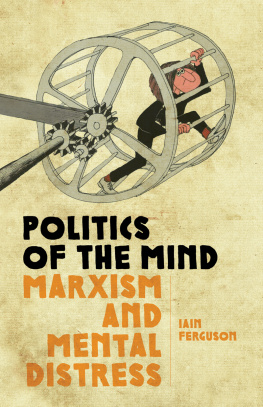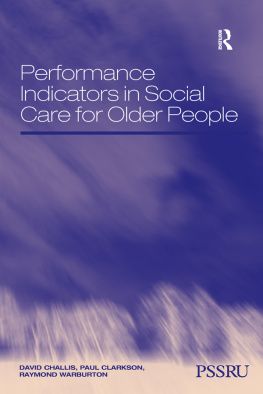ADULT SOCIAL CARE
Iain Ferguson and Michael Lavalette,
with responses from Bill Jordan, Mark Lymbery, Dexter Whitfield, Ian Hood, Brian Smith and Claire Cairns
SERIES EDITORS:
Iain Ferguson and Michael Lavalette

First published in Great Britain in 2013 by
Policy Press
University of Bristol
6th Floor
Howard House
Queens Avenue
Bristol BS8 1SD
UK
t: +44 (0)117 331 5020
f: +44 (0)117 331 5367
www.policypress.co.uk
North American office:
Policy Press
c/o The University of Chicago Press
1427 East 60th Street
Chicago, IL 60637, USA
t: +1 773 702 7700
f: +1 773-702-9756
www.press.uchicago.edu
Policy Press 2013
ISBN 978 1 44731 597 1 Kindle
ISBN 978 1 44731 596 4 epub
British Library Cataloguing in Publication Data
A catalogue record for this book is available from the British Library.
Library of Congress Cataloging-in-Publication Data
A catalog record for this book has been requested.
The right of Iain Ferguson and Michael Lavalette to be identified as authors of this work has been asserted by them in accordance with the Copyright, Designs and Patents Act 1988.
All rights reserved: no part of this publication may be reproduced, stored in a retrieval system, or transmitted in any form or by any means, electronic, mechanical, photocopying, recording, or otherwise without the prior permission of Policy Press.
The statements and opinions contained within this publication are solely those of the contributors and not of the University of Bristol or Policy Press. The University of Bristol and Policy Press disclaim responsibility for any injury to persons or property resulting from any material published in this publication.
Every effort has been made to trace copyright holders and to obtain their permission for the use of copyright material. The publisher apologises for any errors or omissions in the text and would be grateful if notified of any corrections that should be incorporated in future reprints or editions of this book.
Policy Press works to counter discrimination on grounds of gender, race, disability, age and sexuality.
Cover design Policy Press
OTHER TITLES AVAILABLE IN THIS SERIES
POVERTY AND INEQUALITY by Chris Jones and Tony Novak
PERSONALISATION by Peter Beresford
MENTAL HEALTH by Jeremy Weinstein
ETHICS by Sarah Banks
CHILDREN AND FAMILIES by Paul Michael Garrett
for more information about this series visit: www.policypress.co.uk/crdsw.asp
Policy Press also publishes the journal Critical and Radical Social Work , for more information visit: http://www.policypress.co.uk/journals_crsw.asp
Contents
Lead authors (and series editors)
Iain Ferguson is Professor of Social Work and Social Policy at the University of the West of Scotland and a member of the Steering Committee of the Social Work Action Network.
Michael Lavalette is Professor of Social Work and Social Policy at Liverpool Hope University and National Co-ordinator of the Social Work Action Network.
Respondents
Bill Jordan is Professor of Social Policy at the University of Plymouth. He is the author of many articles and books, including Social work and social policy under austerity (with Mark Drakeford) (Palgrave Macmillan, 2012).
Mark Lymbery is Associate Professor of Social Work at the University of Nottingham. He has written extensively on the implications of the personalisation agenda for social workers and service users.
Dexter Whitfield is Director of European Services Strategy Unit and is Adjunct Associate Professor, Australian Institute for Social Research, University of Adelaide. He is the author of In place of austerity: Reconstructing the economy, state and public services (Spokesman Books, 2012).
Ian Hood is co-ordinator of the Learning Disability Alliance Scotland.
Brian Smith is Branch Secretary of Glasgow UNISON and Convenor of Defend Glasgow Services.
Claire Cairns is Network Co-ordinator of the Coalition of Carers in Scotland.
For much of its history, mainstream social work in Britain has been a fairly conservative profession. It has often reflected the dominant political ideologies of the day, while presenting itself as resolutely non-political. Thus, the first social work organisation, the Charity Organisation Society (COS) (1869), rigorously adhered to the Poor Law notion that the poor could be divided into deserving and undeserving, rejected any form of state intervention aimed at improving peoples lives (including free school meals and old-age pensions) and saw the practice of individual casework as the best antidote to the spread of socialist ideas.
By contrast, social work in the 1960s reflected a broad social democratic consensus, evident in the recommendations of the Seebohm Report in England and Wales and the Kilbrandon Report in Scotland on the basis of which the new generic social work departments were established. In most respects, the social work of this period reflected a huge advance on the punitive individualism of the COS (and, it should be said, the punitive individualism of our own time). Even then, however, there was still a tendency to pathologise (albeit it was communities rather than individuals that were seen as failing) and to ignore the extent to which statutory social work intervention continued to be experienced by service users as oppressive and paternalistic. Be that as it may, the progressive possibilities of the new departments were soon cut short by the onset of a global economic crisis in 1973 to which the Labour governments of the time could offer no answer, except cuts and belt-tightening.
What is also true, however, as we have argued elsewhere (Lavalette and Ferguson, 2007), is that there has always been another tradition in social work, an activist/radical approach which has sought to present an alternative vision both to individualism and also to paternalist, top-down collectivism. This approach, which flourished in the UK in the 1970s, located the problems experienced by those who sought social work support in the material conditions of their lives and attempted to develop practice responses that challenged these conditions and their effects.
One source of theory underpinning that approach was the excellent series Critical Texts in Social Work and the Welfare State, edited by Peter Leonard and published by Macmillan.
Three decades on, this current series aims to similarly deepen and refresh the critical and radical social work tradition by providing a range of critical perspectives on key issues in contemporary social work. Social work has always been a contested profession but the need for a space for debate and discussion around ways forward for those committed to a social work practice informed by notions of social justice has never been greater. The issues are complex. How should social workers view personalisation, for example? In an era of austerity, can social work be about more than simply safeguarding and rationing scarce services? Will the integration of services in areas such as mental health lead to improved services or simply greater domination of medical models? Do social work practices offer an escape from managerialism and bureaucracy or are they simply a Trojan horse for privatisation?
These are some of the questions which contributors to this series academics, practitioners, service users and movement activists will address. Not all of those contributing to these texts would align themselves with the critical or radical tradition. What they have in common, however, is a commitment to a view of social work which is much wider than the currently dominant neoliberal models and a belief that notions of human rights and social justice should be at the heart of the social work project.
Next page







